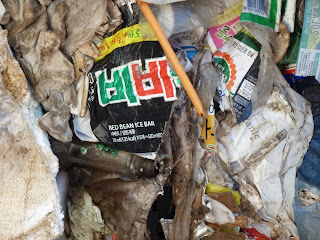DOH, FDA Urged to Enforce Order vs Toxic Plasticizer in Toys
The EcoWaste
Coalition, an environmental watchdog, today urged the country’s top health officials
to act on swimming toys laden with hazardous substances as many families go to
the beaches or pools to beat the intense summer heat.
Through a letter sent to Department of Health (DOH) Secretary Janette Garin and Food and Drugs Administration (FDA) Acting Director Nicolas Lutero III, the group informed the authorities that some beach or pool inflatables had toxic phthalates, a chemical plasticizer, above the DOH limit of 0.1%.
Link to EcoWaste letter to DOH and FDA:
http://ecowastecoalition.blogspot.com/2015/04/letter-to-doh-sec-janette-garin-and-fda.html
Through a letter sent to Department of Health (DOH) Secretary Janette Garin and Food and Drugs Administration (FDA) Acting Director Nicolas Lutero III, the group informed the authorities that some beach or pool inflatables had toxic phthalates, a chemical plasticizer, above the DOH limit of 0.1%.
Link to EcoWaste letter to DOH and FDA:
http://ecowastecoalition.blogspot.com/2015/04/letter-to-doh-sec-janette-garin-and-fda.html
“We bought four swimming toys from legitimate retailers and have these analyzed for phthalates by an independent laboratory as part of our advocacy to protect human and ecological health from harmful chemical substances,” said Thony Dizon, Coordinator of the EcoWaste Coalition’s Project Protect.
The samples were purchased in Quiapo from P50 to P129 and analyzed for phthalates by SGS, a global testing company, through gas chromatography–mass spectrometry.
According to the laboratory results, three of the samples had phthalate DEHP up to 19.6%, while two had phthalate DINP up to 1.29%. One sample with a “phthalate-free” labelling claim passed the laboratory analysis.
As per DOH Administrative Order 2009-0005-A as amended in December 2011, “it shall be unlawful to manufacture for sale, offer for sale, distribute in commerce, or import into the country any children’s toy that contains concentration of more than 0.1 percent of di-(2-ethylhexyl) phthalate (DEHP), dibutyl phthalate (DBP) or benzyl butyl phthalate (BBP).
The said A.O. also prohibits diisononyl phthalate (DINP), diisodecyl phthalate (DIDP), or di-n-octyl phthalate (DnOP) in any children’s toy that can be placed in a child’s mouth in concentrations above 0.1% by weight.
To enforce DOH A.O. 2009-0005-A and to protect children from being exposed to phthalates, the EcoWaste Coalition called on the DOH to cause the ban and withdrawal from the market of the above three samples of swimming toys that failed the laboratory tests.
“We also humbly urge the DOH to fully maximize the FDA’s laboratory capability to analyze for phthalates by embarking on an upbeat drive to test certain products for phthalate content in time for the school opening in June 2015,” Dizon said.
This will mean the FDA undertaking market inspection, particularly in Divisoria, and sampling back-to-school children’s products such as polyvinyl chloride (PVC) bags, raincoats and school supplies, Dizon explained.
“A proactive effort to test children’s products for phthalates (as well as for other priority chemicals of concern such as lead, cadmium and mercury) would send a strong message to producers, retailers and consumers that the Aquino administration is taking children’s safety from hazardous substances a priority concern,” the EcoWaste Coalition said in its letter to Garin and Lutero.
“Such a drive, we believe, will also push companies to follow the government’s toy safety regulations, disclose chemical information and adopt clean production practices such as toxics use reduction and substitution,” the group said.
To emphasize the problem with phthalates, the EcoWaste Coalition cited information from a newly-published guide by the Endocrine Society and IPEN stating that “phthalate exposure is linked to genital abnormalities in boys, reduced sperm counts, decreased ‘male typical’ play in boys, endometriosis, and elements of metabolic disruption including obesity.”
The Endocrine Society is the world's oldest, largest, and most active organization devoted to research on hormones and the clinical practice of endocrinology, while IPEN is a global network of public interest groups promoting safer chemical policies and practices of which the EcoWaste Coalition is a part of.
“The EcoWaste Coalition will support precautionary and preventive measures to be undertaken by the DOH and FDA to protect our children and people from being further exposed and harmed by phthalates and other endocrine disrupting chemicals,” Dizon stated.
Reference:
http://www.ipen.org/documents/introduction-endocrine-disrupting-chemicals-edcs




Comments